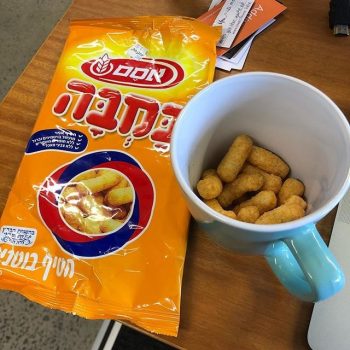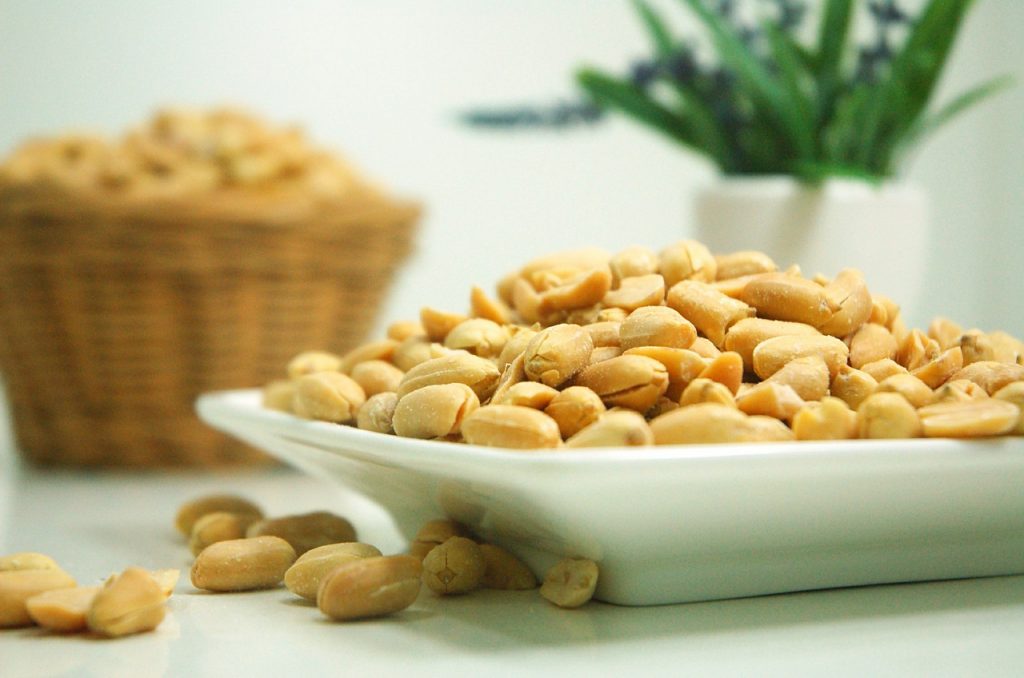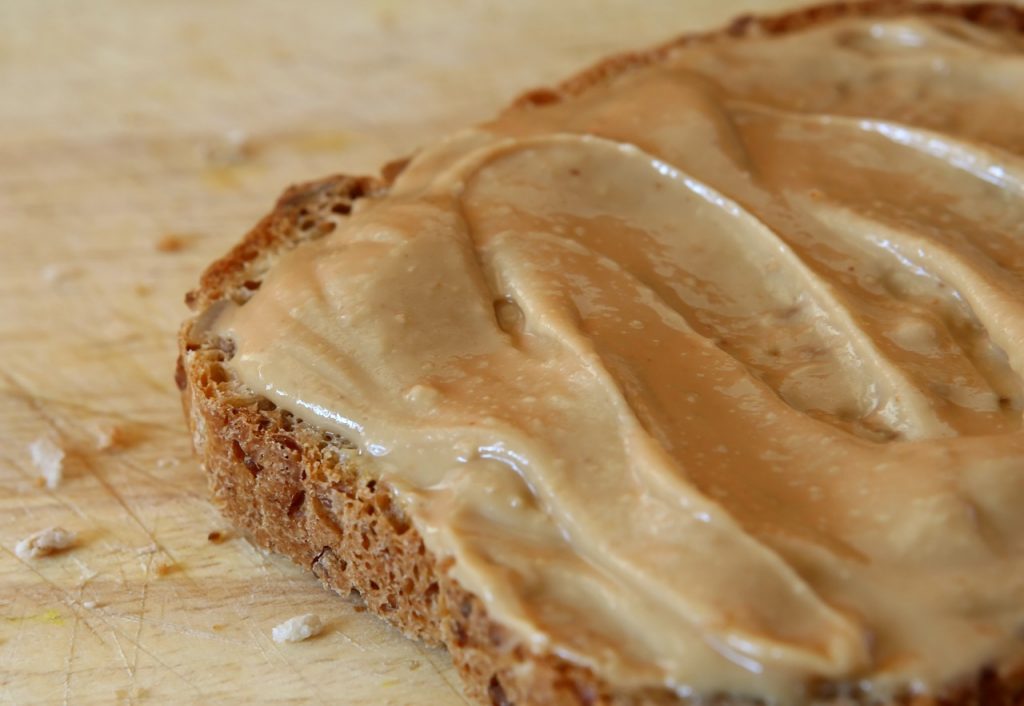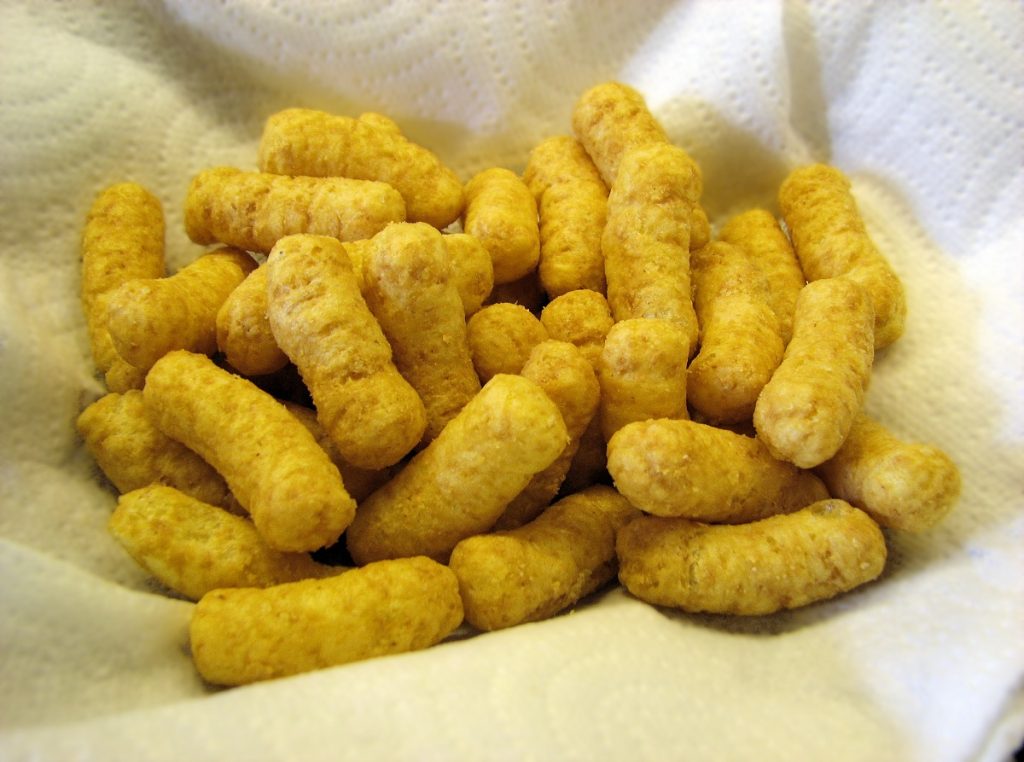One million bags of Bamba, the popular Israeli snack food, are produced every day at a new factory in Kiryat Gat, a southern Israeli city about an hour’s drive from Tel Aviv. The new production line means the Osem company can now meet the increasing demand for bags of the popular peanut puff treat in Israel and around the world.
The country’s best-selling snack food has seen an upswing in popularity in North America and Europe following breakthrough studies that specifically named Bamba in helping to protect children from developing peanut allergies.
“When we invented Bamba 55 years ago, we never thought it would become the best-selling snack in Israel or that it would attract such interest abroad as well,” Osem Chairman Dan Propper, said at the February 19 opening ceremony of the new factory, built with an investment of about NIS 200 million ($55 million) on an area of 16,000 square meters.

Bamba in a cup. By Alan Jones via Flickr, CC BY 2.0
Indeed, this peanut butter-flavored puffed maize snack-in-a-bag wasn’t particularly popular when first introduced in 1964. Actually, Bamba started off as cheese-flavored, similar to Cheetos. It didn’t appeal to local taste buds. But in 1966, Osem replaced the cheese-flavor with peanut-flavored Bamba and its popularity began rising.
Since 2007, Bamba has been the country’s bestselling savory snack.
And though 90 percent of Israeli households buy Bamba regularly, there was no way of foreseeing that this savory maize would one day find itself in science and medical journals, or the official Guidelines For The Prevention Of Peanut Allergy In The United States: Report Of The National Institute Of Allergy And Infectious Diseases.
But in 2015, that’s exactly what happened. The world’s attention turned to this snack food upon the publication of the Learning Early About Peanut Allergy (LEAP) study, which set out to prove that the very low rates of peanut allergy among Israeli children were a result of high levels of peanut consumption – and, specifically, the consumption of Bamba — beginning in infancy.
The results catapulted Bamba to global headlines when it was found that exposing infants to peanuts within their first year helped prevent peanut allergy by as much as 81 percent.
Moreover, the research was supported by the National Institute of Allergy and Infectious Diseases (NIAID), part of the National Institutes of Health, an agency of the United States Department of Health and Human Services and was conducted by the NIAID-funded Immune Tolerance Network.
In other words, it was not a minor study or questionable science.
“The results have the potential to transform how we approach food allergy prevention,” Dr. Anthony S. Fauci, Director of NIAID, said at the time.
His statement proved prophetic.

Peanuts on a plate. Image by forwimuwi73 on Pixabay
Fast forward to 2019, and peanut allergy continues to be a growing health problem in the United States, and the rest of the world, and for which no treatment or cure is available.
“Food allergies are on the rise with more than 1 in 13 children now suffering from at least one. Thankfully, recent landmark studies (LEAP, EAT, PETIT) have proven that exposing babies to food allergens early and often can reduce their risk of developing allergies by 67–80 percent,” reads a press statement sent to NoCamels by Ready, Set, Food! a US-based allergy prevention firm.
In the US, the prevalence of food allergies increased by 70 percent in kids younger than 18 between 1997 and 2016, according to a CDC report.
Peanut allergy is one of the most life-threatening allergies, according to the Mayo Clinic. Around the globe, drug companies and health organizations are seeking peanut allergy treatments for children who are already allergic to peanuts and those who are at risk.
Peanut allergies affect an estimated 1.2 percent of the overall US population, according to a report in AJMC. The report also shows that peanut allergies place “a tremendous burden on the US healthcare system, employers, schools, and the parents and children affected.”
So, it makes sense why the demand for Bamba is on the up and up.
Sign up for our free weekly newsletter
Subscribe“I tell parents, if they can find it easily, they can use it,” Dr. Vandana Patel, a Charlotte pediatrician who specializes in allergies, told the Charlotte Observer. “Bamba is a nice, easy, portable, fun, chewy way to feed this thing.”
In an about turn, the US Food and Drug Administration (FDA) even granted a qualified health claim for ground whole peanuts – which includes Bamba.
Moreover, the National Institute of Allergy and Infectious Diseases issued Addendum Guidelines for the Prevention of Peanut Allergy in the United States, based on the LEAP study. On page 25 of the updated 2017 guidelines, NIAID recommends 21 pieces of Bamba as one of the four recipe options with which to introduce an infant with low risk of allergy to peanut protein.
And now, four years after the groundbreaking LEAP study results were published, the demand for this snack that resembles Styrofoam packing peanuts and melts in one’s mouth, continues to grow in demand.
Israeli food producer Osem says its near-future goal is to produce about 1.5 million bags a day.
“Our dream is to see Bamba in every supermarket in the US and Europe,” says Osem Group’s CEO Avi Ben-Assayag. “Thanks to the factory … we will be able to double production capacity and provide for demand in Israel and the increasing demand for Bamba in the US. This is the most innovative food factory in Israel, with one of the most advanced quality control systems in the world and a closed and automated production system.”

Peanut butter on toast. Image by NjoyHarmony on Pixabay
It’s not that Bamba hasn’t been available for purchase around the world. For more than 30 years, Osem has been marketing its products to the kosher food market in the US and Europe through Osem USA and Osem UK.
But the general public in the US and Europe has shown readiness to add Bamba to their snacking options. And Osem has responded that it is ready to take a bigger bite out of the American and European snacks market.
In 2018, Osem began marketing Bamba to retail chains in the US in the Better-for-You snacks category. American retail giant, Walmart, is selling the Israeli baked snack containing 50 percent peanuts.
Hebrew media sources in Israel recently hyped reports that Nestle’s baby snacks section was set to announce its adoption of Bamba for widespread US distribution. But a Nestle spokesperson told NoCamels that “Osem will continue to work diligently on marketing Bamba in North America through its US subsidiary Osem USA. Osem is not negotiating with Nestlé over Bamba’s distribution.”
So while the initial local reports may not have been exact, Nestle and Osem are in tandem when it comes to Bamba.
Ben-Assayag spoke about Nestle’s involvement in establishing the new factory.
“The way in which Nestle has guided the process of planning and building the factory, and their significant investment in it, show the extent of the huge commitment of Osem and Nestle, and the immense trust Nestle has placed in Osem as a company that excels at innovation. This path ensures the continued development of Israeli manufacturing and Osem’s position as one of Nestle’s leading worldwide organizations,” he said.
The new factory, added Propper, realizes “the commitment of Osem and Nestle to invest in the development of industry in Israel and to expand sales of Bamba around the world.”
Osem said it plans to supply Bamba to additional retail chains and pharmacies in the US in the coming months.
Viva Sarah Press is a journalist and speaker. She writes and talks about the creativity and innovation taking place in Israel and beyond. www.vivaspress.com
Related posts

Israeli Medical Technologies That Could Change The World

Harnessing Our Own Bodies For Side Effect-Free Weight Loss

Missing Protein Could Unlock Treatment For Aggressive Lung Cancer




Facebook comments